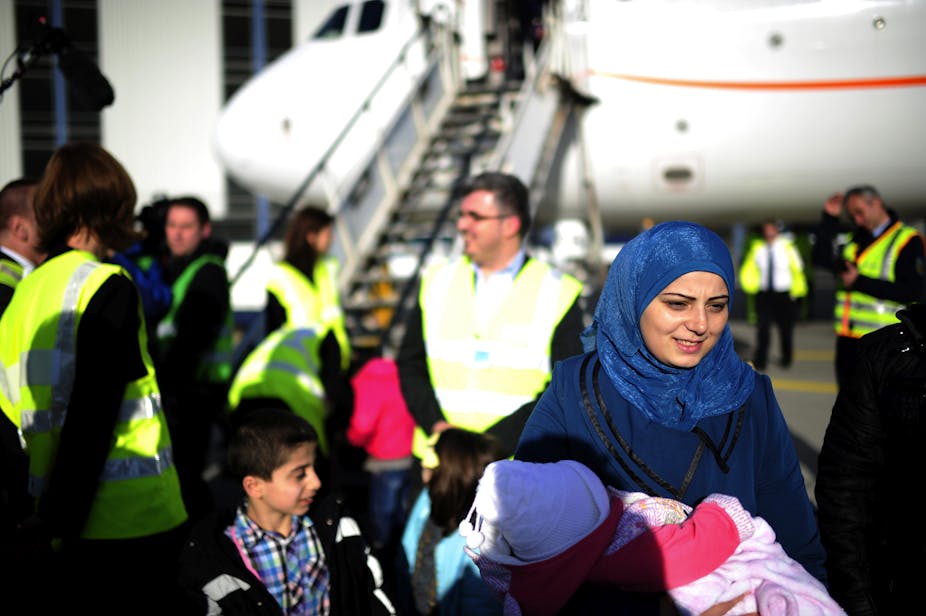Close to four million refugees have fled from Syria since the beginning of the civil war in 2011. This is the largest refugee population currently under the care of the UN’s refugee agency, UNHCR.
According to Amnesty International, around 3.8 million Syrians are being hosted by the nation’s most immediate neighbours – Turkey, Lebanon, Jordan, Iraq and Egypt. Only 1.7% of them have been offered sanctuary by other countries, and Europe has a particularly patchy record in this respect. Using data from the CIA World Factbook and the UNHCR, I was able to crunch the numbers and get an understanding of who is pulling their weight, when it comes to taking in Syrian refugees.

In the graph above, we can see that Germany has made by far the most pledges to shelter Syrian refugees, offering about 30,000 places. They can be proud of that, no other country is anywhere near that number. By reconfiguring the graph with a log scale – so that the smaller numbers take up more space – we can take a look at the pledges of other European countries in more detail.
Below, we can see that Hungary only offers around 25 places. Portugal and the UK offer less than 100 places each. Sweden offers about 2,500. We can also see that every country apart from Ireland and Finland have more applicants for asylum than places offered.

But these countries are all quite different. Surely it would not be reasonable to expect Portugal to offer the same number of places as Germany. One obvious explanation might be that countries with bigger populations offer more places.
But that is not actually the case – Germany still offers far more places than all the others, relative to their populations, while the UK and France, the next two most populous countries, fall far behind. In contrast, Sweden is quite small, yet it still offers the second largest number of places.

But perhaps it’s a matter of wealth. One might expect countries with greater financial resources to offer more places. We can assess this by comparing each country’s gross domestic product (GDP) with the number of places it offers to refugees. But again, leaving Germany aside, there seems to be no relation between how much money a country has and how many refugees it is willing to take in. Richer countries are no more willing to help.

The final check – and in my opinion, the most interesting one – is to what extent there exists a relation between the number of pledges per capita, and GDP per capita. A country’s offer of places should be proportional both to its population and its amount of wealth per person. If a country is either poor or small, it can’t offer many places. And countries with more resources per person should, in theory, offer more places relative to their population.

This plot shows several interesting things. German people are very rich, and they offer far more places in relation to its population than all others. Sweden does quite well too. In the bottom left corner are some of the least wealthy countries of the EU: Hungary, Poland, and Portugal. As we might expect, these countries offer only a few places for Syrian refugees per million inhabitants. But apart from these predictable results, there is a very weak connection between the number of places offered to refugees and the GDP per capita.
In fact, think about the bottom right corner: these are countries with a high GDP per capita – in other words, with wealthy citizens – which are reluctant to offer places per inhabitant to Syrian refugees. Ireland is a complicated case, because its GDP is highly influenced by the companies that use it as a tax base, but whose money can easily flow out of the country.
France, the UK, Denmark, Belgium, and The Netherlands all stand out as being European countries which could afford to shelter more refugees of the Syrian conflict – if they wanted to. There are, of course, other ways to help and several reasons why a country might choose to close the door on Syrian refugees: concerns about terrorism could be one of them – yet this applies to Germany and Sweden as well. Domestic politics and approaching elections may weigh heavier on the hearts of decision makers than the struggles of refugees to whom the doors are shut. Whatever the reasons, these are the numbers. And they make you wonder.

